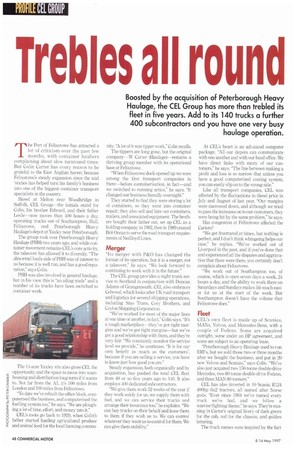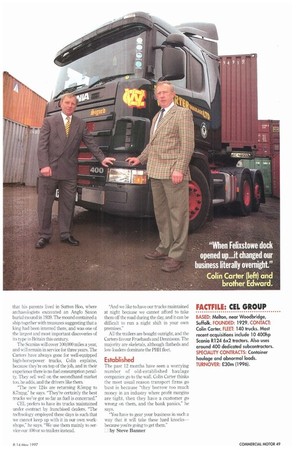Trebles all round
Page 50

Page 51

If you've noticed an error in this article please click here to report it so we can fix it.
Boosted by the acquisition of Peterborough Heavy Haulage, the CEL Group has more than trebled its fleet in five years. Add to its 140 trucks a further 400 subcontractors and you have one very busy haulage operation.
The Port of Felixstowe has attracted a lot of criticism over the past few months, with container hauliers complaining about slow turnround times. But Colin Carter has every reason to be grateful to the East Anglian haven; because Felixstowe's steady expansion since the mid 'sixties has helped turn his family's business into one of the biggest container transport specialists in the country
Based at Melton near Woodbridge in Suffolk, CEL Group—the initials stand for Colin, his brother Edward, and their father Leslie—now moves than 400 boxes a day, operating trucks out of Southampton, Hull. Felixstowe, and Peterborough Heavy I 'outage's depot at Yaxley near Peterborough.
The group took over Peterborough !Leavy Haulage (PHH) two years ago, and while container movement remains CEL's core activity. the takeover has allowed it to diversify "The abnormal loads side of PI-11-1 was of interest to us because it is well run, and has a good reputation," says Colin.
PRH was also involved in general haulage, but in his view this is "an ailing trade" and a number of its trucks have been switched to container work.
The 14-acre Yaxley site also gives CEL the opportunity and the space to move into warehousing and distribution long-term if it wants to. Not far from the Al, it's 100 miles from London and 100 miles from Felixstowe.
"To date we've rebuilt the office block, computerised the business, and computerised the fuelling system too," he says. "We are ploughing a lot of time, effort, and money into it."
CEL's roots go back to 1929, when Colin's father started hauling agricultural produce and animal feed for the local farming commu nit-y. "A lot of it was tipper work," Colin recalls.
The tippers are long gone, but the original company—W Carter (Haulage)—remains a thriving group member with its operational base at Felixstowe.
"When Felixstowe dock opened up we were among the first transport companies in there—before containerisation, in fact—and we switched to running artics," he says. "It changed our business literally overnight."
They started to find they were storing a lot of containers, so they went into container repair; they also sell and hire out containers, trailers, and associated equipment. The brothers bought their father out, set up CEL as a holding company in 1982, then in 1989 created Brit Ocean to serve the road transport requirements of Nedlloyd Lines.
Merger
Its merger with P&O has changed the format of its operation, but it is a merger, not a takeover," he says. "We look forward to continuing to work with it in the future."
The CEL group provides a night trunk service to Scotland in conjunction with Duncan Adams of Grangemouth. CEI. also embraces Celwood, which looks after UK road transport and logistics for several shipping operations, including Sin() Trans, Cory Brothers, and Ceylon Shipping Corporation.
"We've worked for most of the major lines at one time or another, in fact." Colin says. "It's a tough marketplace—they've got tight margins and we've got tight margins—but we've got a good relationship with them, and they're very fair. "We constantly monitor the service level we provide," he continues. "It is for our own benefit as much as the customers', because if you are selling a service, you have to know just how good you are."
Steady expansion, both organically and by acquisition, has pushed the total CEL fleet from 40 or so five years ago to 140. It also employs 400 dedicated subcontractors.
"We give them work 52 weeks of the year if they work solely for us, we supply them with fuel, and we can service their trucks and arrange their insurance too," he explains. "We can buy trucks on their behalf and lease them to them if they wish us to. We can control whatever they want us to control for them. We can give them stability." At CEL's heart is an advanced computer package. "All our depots can communicate with one another and with our head office. We have direct links with many of our customers," he says. "The line between making a profit and loss is so narrow that unless you have a good computerised costing system, you can easily slip on to the wrong side."
Like all transport companies, CEL was affected by the fluctuations in diesel price in July and August of last year. "Our margins were narrowed down, and although we tried to pass the increases on to our customers, they were being hit by the same problem," he says.
Has congestion at Felixstowe affected the Carters?
"We get frustrated at times, but nothing is perfect, and I don't think whingeing helps our case," he replies. "We've worked out of Liverpool in the past, and if you've done that and experienced all the disputes and aggravation that there were there, you certainly don't complain about Felixstowe.
"We work out of Southampton too, of course, which is open seven days a week, 24 hours a day, and the ability to work there on Saturdays and Sundays makes life much easier for us at the start of the week. But Southampton doesn't have the volume that Felixstowe does."
Fleet
CEL's own fleet is made up of Scanias, MANs, Volvos, and Mercedes-Benz, with a couple of Fodens. Some are acquired outright, some under an LIP agreement, and some are subject. to an operating lease.
"Peterborough Heavy Haulage used to run ERFs, but we sold those two or three months after we bought the business, and put in 20 new Volvos and Scanias," says Colin. "We've also just acquired two 150-tonne double-drive Mercedes, two 80-tonne double-drive Fodens, and three MAN 80-tonners."
CEL has also invested in 10 Scania R124 400hp 6x2 tractors, all named after Norse gods. "Ever since 1964 we've named every truck we've had, and we follow a waiTior/fighting theme," he says. They're running in Carter's original livery of dark green for the cab, red for the chassis, and golden lettering.
The truck names were inspired by the fact
that his parents lived in Sutton Hoo, where archaeologists excavated an Anglo Saxon burial mound in 1939. The mound contained a ship together with treasures suggesting that a king had been interred there, and was one of the largest and most important discoveries of its type in Britain this century.
The Scan ias will cover 100,000 miles a year, and will remain in service for three years. The Carters have always gone for well-equipped high-horsepower trucks, Colin explains, because they're on top of the job, and in their experience there is no fuel consumption penalty. They sell well on the secondhand market too, he adds, and the drivers like them.
"The new 124s are returning 8.5mpg to 8.7mpg," he says. "They're certainly the best trucks we've got so far as fuel is concerned."
CEL prefers to have its trucks maintained under contract by franchised dealers. "The technology employed these days is such that we cannot keep up with it in our own workshops,' he says. "We use them mainly to service our 400 or so trailers instead. "And we like to have our trucks maintained at night because we cannot afford to take them off the road during the day, and it can be difficult to run a night shift in your own premises."
All the trailers are bought outright, and the Carters favour Fruehaufs and Dennisons. The majority are skeletals, although flatbeds and low-loaders dominate the PH1-I fleet.
Established
The past 12 months have seen a worrying number of old-established haulage companies go to the wall. Colin Carter thinks the most usual reason transport firms go bust is because "they borrow too much money in an industry where profit margins are tight, then they have a customer go wrong on them, and the bank panics," he says.
"You have to gear your business in such a way that it will take these hard knocks because you're going to get them."
Li by Steve Banner
FACTFILE: CEL GROUP BASED: Melton, near Woodbridge, Suffolk. FOUNDED: 1929. CONTACT: Colin Carter. FLEET: 140 trucks. Most recent acquisitions include 10 400hp Scania R124 6x2 tractors. Also uses around 400 dedicated subcontractors. SPECIALITY CONTRACTS: Container haulage and abnormal loads. TURNOVER: £30m (1996.)




























































































































